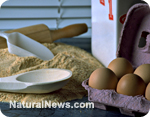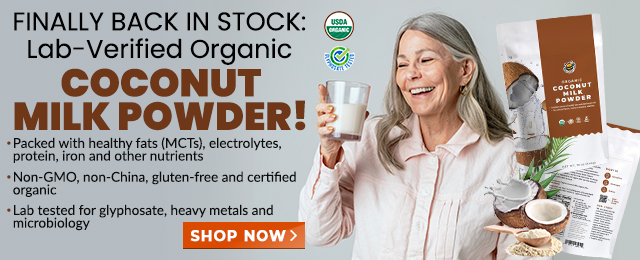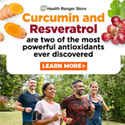
Vitamin K1 may Protect Postmenopausal Women with Osteopenia
Monday, January 05, 2009 by: Reuben Chow
Tags: vitamin K, health news, Natural News
- Aerosolized bioweapons? Strange “diploid biomasses” falling out of the sky in Florida captured under the microscope
- Widespread social and economic unrest: Steve Quayle issues urgent financial warning of imminent asset collapse in new interview with Mike Adams
- Israeli lobbyists boast of controlling US national security policy in leaked AIPAC audio
- Analysis: The coming economic collapse, a mass uprising and Trump's three secret weapons to halt the growing revolt
- U.S. lawmakers investigate Meta over alleged China collaboration
- Fauci is back in the limelight, and he’s busy promoting a future COVID or FLU pandemic
- Kiss Your Genetic Privacy Good-Bye! 23andMe Gets Green Light to Sell Your Intimate Genetic Details to Anyone They Want
- Mike Adams releases country western hit single: Goin’ Back in Time is Comin’ Home
- Warp Speed 2.0: Trump Administration ACCELERATES Gates-funded, self-amplifying bird flu vaccines
- TAKE IT DOWN Act advances in Congress amid free speech concerns
- CLOT SHOT PLANDEMIC UNFOLDING: Fibrous, rubbery clots caused by covid injections have prion-like seeding activity
- DMSO and Natural Dyes: A suppressed cancer treatment resurfaces in independent research
- Tulsi Gabbard leads charge against the Biden regime’s global censorship of the 'Disinformation Dozen'
- Father speaks out: Challenging the mainstream narrative of his daughter’s “unvaccinated measles death”
- Curcumin’s ancient healing power supercharges muscle recovery, and its effects are compounded with anti-inflammatory foods and supplements
- Defunding DEADLY mRNA jabs: Government funding for mRNA technology being scrutinized and sidelined until proven "safe and effective" for real
- Chemical cocktails in processed foods linked to diabetes, validating natural health warnings
- Pfizer's RSV vaccine linked to preterm births as drug giant CONCEALED RISKS from pregnant women in unethical clinical trials
- Aerosolized bioweapons? Strange “diploid biomasses” falling out of the sky in Florida captured under the microscope
- Fauci is back in the limelight, and he’s busy promoting a future COVID or FLU pandemic
- Tulsi Gabbard leads charge against the Biden regime’s global censorship of the 'Disinformation Dozen'
- Analysis: The coming economic collapse, a mass uprising and Trump's three secret weapons to halt the growing revolt
- Widespread social and economic unrest: Steve Quayle issues urgent financial warning of imminent asset collapse in new interview with Mike Adams
- Kiss Your Genetic Privacy Good-Bye! 23andMe Gets Green Light to Sell Your Intimate Genetic Details to Anyone They Want
- U.S. lawmakers investigate Meta over alleged China collaboration
- Mike Adams releases country western hit single: Goin’ Back in Time is Comin’ Home
- Israeli lobbyists boast of controlling US national security policy in leaked AIPAC audio
- Chemtrails unveiled: How the CIA and Big Business are manipulating the weather for profit
- Curcumin’s ancient healing power supercharges muscle recovery, and its effects are compounded with anti-inflammatory foods and supplements
- CLOT SHOT PLANDEMIC UNFOLDING: Fibrous, rubbery clots caused by covid injections have prion-like seeding activity
- China’s counter-tariff strategies: A new chapter in the U.S.-China trade war
- Pfizer's RSV vaccine linked to preterm births as drug giant CONCEALED RISKS from pregnant women in unethical clinical trials
- Shedding light on the dark side of MMR vaccines: How vaccinated individuals SPREAD MEASLES & put the vulnerable at risk
- Dane Wigington exposes climate engineering as ‘All-Out Weather and Biological Warfare’
- Defunding DEADLY mRNA jabs: Government funding for mRNA technology being scrutinized and sidelined until proven "safe and effective" for real
- DEATH by VACCINE or face PRISON time: Canadian Freedom Convoy leaders CONVICTED for protesting forced vaccination during the Covid Plandemic
- Newly released JFK files reveal Pentagon's role in creating Lyme disease and covid in the same lab
- Analysis: The coming economic collapse, a mass uprising and Trump's three secret weapons to halt the growing revolt
- Mike Adams releases country western hit single: Goin’ Back in Time is Comin’ Home
- Aerosolized bioweapons? Strange “diploid biomasses” falling out of the sky in Florida captured under the microscope
- Kiss Your Genetic Privacy Good-Bye! 23andMe Gets Green Light to Sell Your Intimate Genetic Details to Anyone They Want
- European Court of Justice: Healthcare professionals who promoted or administered COVID-19 vaccines are CRIMINALLY LIABLE for any harm caused
- Federal employees whine over DOGE's new directive requiring them to do a 5-point summary of weekly accomplishments
- U.S. approves new Russian ambassador as diplomatic thaw continues
- Government waste exposed: Hegseth supports Musk’s demand for accountability from federal workers
- Now you can HEAR chemistry: Health Ranger translates molecules into music in stunning video demonstration that will blow your mind (and your ears)
- Widespread social and economic unrest: Steve Quayle issues urgent financial warning of imminent asset collapse in new interview with Mike Adams
- Dr. Mike Yeadon releases 15-minute testimony - WATCH - about genocidal intent of COVID “vaccines”
- The Health Ranger releases “Vaccine Zombie” song and music video, using AI-animated zombies for the music video
- Trump reverses course on Gaza plan, says “nobody is expelling Palestinians”
- EPA advisor admits the agency is funneling billions to climate groups ahead of Trump’s return to White House
- 5 Simple steps to boost your brainpower: How to strengthen executive function in a distracted world
- I Want My Bailout Money – new song and music video released by Mike Adams
- Tulsi Gabbard leads charge against the Biden regime’s global censorship of the 'Disinformation Dozen'
- Red Cross issues warning to stop blood plasma donations from vaccinated people
- Scientists confirm: GENIUS brain function can be spontaneously unleashed in humans without any apparent cause
- EPA advisor admits the agency is funneling billions to climate groups ahead of Trump’s return to White House
- HYSSOP: What research reveals about the health benefits of this ancient holy herb
- Two containers with completed ballots fall out of truck in Florida
- Newly released JFK files reveal Pentagon's role in creating Lyme disease and covid in the same lab
- Global leaders unite to clamp down on “misinformation” with UN-backed Cascais Declaration
- BREAKING: 2025 NDAA authorizes mandatory military draft of WOMEN across America… as Pentagon pursues global NUCLEAR war with both Russia and China at the same time
- Mike Adams releases country western hit single: Goin’ Back in Time is Comin’ Home
- Michael Yon warns of a ZIONIST TAKEOVER in Trump’s second administration
- Ozempic and Wegovy weight loss drugs are injectable LIZARD VENOM PEPTIDES that may unleash a devastating wave of organ failure… side effects align with symptoms of SNAKE BITES
- The Health Ranger releases “Vaccine Zombie” song and music video, using AI-animated zombies for the music video
- BOMBSHELL: DNA testing kits are a SCAM to develop ethnic-specific bioweapons
- Israeli soldiers accused of even more torture and abuse in the West Bank
- These 13 countries just signed an agreement to engineer a global FAMINE by destroying food supply
- I Want My Bailout Money – new song released by Mike Adams
- NASA admits that climate change occurs because of changes in Earth’s solar orbit, and NOT because of SUVs and fossil fuels
- RFK Jr. clears key hurdle: Sen. Susan Collins backs controversial HHS nominee, signaling a new era for health policy
Details of Study
The study, which was randomized, controlled and led by Dr Angela Cheung, looked at a group of 440 postmenopausal women who suffered from osteopenia. The women were split into two groups – one group received 5 mg of vitamin K1 daily for a period of two years, while the other group received a placebo. In order to find out the effects of long-term consumption of vitamin K1, 260 of the women then continued their treatment for another two more years.
All in all, the study team reported that vitamin K1 supplementation was well tolerated by the subjects over the entire 4-year period, and no particular adverse health effects were associated with long-term vitamin K1 supplementation.
Findings of Study
Tests taken at the 2-year and 4-year marks of the study measured the bone mineral density of the women. Measurements were taken at the lower back and hip.
The study found that bone density had decreased at similar rates in both the vitamin K1 and control groups. This implied that vitamin K1 did not stem the loss of bone density which is generally related to advancement in age. However, what was significant was that the women who consumed vitamin K1 suffered fewer fractures than the other group. In the former group, there were only 9 fracture incidents, as compared with 20 in the latter group.
In addition, vitamin K1 seemed to offer a protective effect against cancer, too. In the vitamin K1 group, only 3 women got cancer, as opposed to 12 in the placebo group.
Discussion
The study team has urged caution on their findings with regard to cancer and fractures. This is because, firstly, their study is quite small and, also, it was not actually designed to look at the two conditions. In the long run, larger studies would definitely be needed and, until then, they do not recommend high dose vitamin K1 supplementation for preventing osteoporosis. It would thus also follow that cancer patients or those seeking to prevent the disease should not be rushing to load up on vitamin K1.
Having said that, however, vitamin K, which is a fat soluble vitamin, is critical for good health, in particular for proper bone formation and blood clotting. Only with vitamin K can our health be aye okay, and it would thus be prudent for us to ensure that we get a decent amount of it via our diet.
Good sources of vitamin K include green leafy vegetables, such as broccoli, collards, kale and spinach. It is also found in vegetables such as asparagus, brussels sprouts, cabbage, green peas, romaine lettuce and Swiss chard. Other decent dietary sources of the vitamin include canola oil, cottonseed oil, olive oil and soybean oil.
Main Source
Vitamin K Does Not Stem Bone Mineral Density Decline In Postmenopausal Women With Osteopenia, Study Shows (http://www.sciencedaily.com/releases/2008/10...)
About the author
Reuben Chow has a keen interest in natural health and healing as well as personal growth. His website, All 4 Natural Health, offers a basic guide on natural health information. It details simple, effective and natural ways, such as the use of nutrition, various herbs, herb remedies, supplements and other natural remedies, to deal with various health conditions as well as to attain good health. His other websites also cover topics such as depression help, omega 3 fatty acids, as well as cancer research and information.Vitamin K at FETCH.news
Get independent news alerts on natural cures, food lab tests, cannabis medicine, science, robotics, drones, privacy and more.
Take Action: Support Natural News by linking to this article from your website
Permalink to this article:
Embed article link: (copy HTML code below):
Reprinting this article:
Non-commercial use OK, cite NaturalNews.com with clickable link.
Follow Natural News on Facebook, Twitter, Google Plus, and Pinterest
Science News & Studies
Medicine News and Information
Food News & Studies
Health News & Studies
Herbs News & Information
Pollution News & Studies
Cancer News & Studies
Climate News & Studies
Survival News & Information
Gear News & Information
News covering technology, stocks, hackers, and more



"Big Tech and mainstream media are constantly trying to silence the independent voices that dare to bring you the truth about toxic food ingredients, dangerous medications and the failed, fraudulent science of the profit-driven medical establishment.
Email is one of the best ways to make sure you stay informed, without the censorship of the tech giants (Google, Apple, Facebook, Twitter, YouTube, etc.). Stay informed and you'll even likely learn information that may help save your own life."
–The Health Ranger, Mike Adams












































